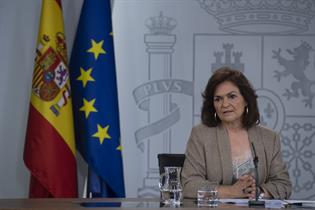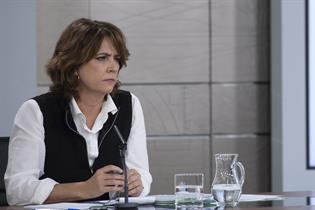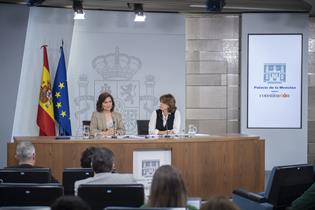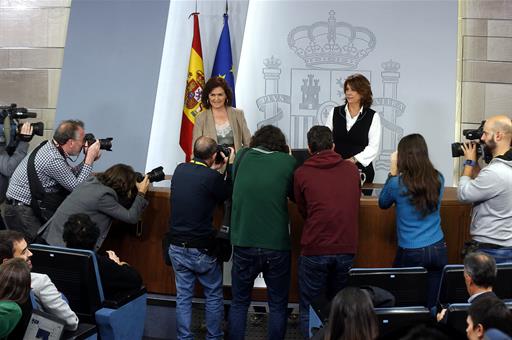Council of Ministers
Government takes steps in administrative procedure to exhume remains of Francisco Franco
Council of Ministers - 2018.11.2
Moncloa Palace, Madrid
The Council of Ministers adopted two decisions that affect the exhumation of the remains of the dictator Francisco Franco. On the one hand, it rejected the appeal for reversal against the exhumation procedure and the transfer of his mortal remains, lodged by the Benedictine Abbey of Santa Cruz del Valle de los Caídos.
It also rejected the challenge filed by a relative of the dictator against the procedural investigation to recognise and extend the rights of those who suffered persecution or violence during the Civil War and the Dictatorship.
The Vice-President of the Government, Minister for the Presidency, Parliamentary Relations and Equality, Carmen Calvo, stated that the "government is proceeding with absolute normality" in the administrative procedure to exhume the remains of Francisco Franco. She also announced that next week's Council of Ministers may take the last administrative step in the procedure.
Carmen Calvo underlined that "under no circumstance" can the remains of the dictator stay in a place that may be a forum for tribute or glorification. "We want the collaboration of the Catholic Church to be addressed to the purpose that the law states, which is that Francisco Franco does not lie in a State or is glorified in any way whatsoever", she said.
In this regard, she clarified that she conveyed this issue on Monday to the Secretary of State of the Holy See, Cardinal Pietro Parolin, and received "a clear and straight-forward response: the Church will not oppose the exhumation of his remains".
Extraordinary aid for those affected by storms
 Pool Moncloa/Borja Puig de la BellacasaThe government declared the provinces of Malaga, Seville, Cadiz, Valencia, Castellon, Tarragona, Teruel and the Autonomous Region of the Balearic Islands, which all suffered damage caused by the torrential rainfall and flooding on 18, 19, 20 and 21 October, as Zones Seriously Affected by a Civil Protection Emergency.
Pool Moncloa/Borja Puig de la BellacasaThe government declared the provinces of Malaga, Seville, Cadiz, Valencia, Castellon, Tarragona, Teruel and the Autonomous Region of the Balearic Islands, which all suffered damage caused by the torrential rainfall and flooding on 18, 19, 20 and 21 October, as Zones Seriously Affected by a Civil Protection Emergency.
The Vice-President of the Government highlighted the coordinated response by the government right "from the outset", as well as its solidarity and responsibility with regard to these disastrous events. In this regard, she announced that extraordinary aid and Personal Income Tax breaks for those affected have been approved.
Resolution of Regional Parliament of Catalonia on the monarchy
The government agreed, as it announced last Friday, to lodge an appeal before the Constitutional Court against the Resolution adopted by the Regional Parliament of Catalonia against the King of Spain and the monarchy.
The Vice-President of the Government declared that the government respects the work of the Council of State "with absolute conviction" and its report on this matter, although she recalled that this is "a mandatory, but not binding, report". However, she added that the government "feels it would be extremely opportune for the Constitutional Court to hand down a ruling on this matter".
Carmen Calvo argued that a regional parliament cannot invade an area of competency over which it has no powers and much less so change the form of State through a regional resolution, and hence the government will appeal "on legal grounds and with the extraordinarily political connotation of a reproach at such an attempt by the Regional Parliament of Catalonia".
Catalan regional housing laws
The Council of Ministers will ask the President of the Government, Pedro Sánchez, to withdraw the appeals lodged by the previous government before the Constitutional Court against Regional Acts 24/2015 and 4/2016 on Emergency Housing, approved by the Regional Parliament of Catalonia.
The Vice-President of the Government specified that an agreement has been reached with the Regional Government of Catalonia, which accepted the proposal to partially withdraw the appeals. The laws, she pointed out, affect "day-to-day problems that are very important for Central Government, because they are related to housing, rentals, and to boosting public housing".
Conclusions on the Catalan independence process
The Minister for Justice, Dolores Delgado, informed the Council of Ministers about the written document containing the provisional conclusions that the State Legal Services have presented in the case which is being tried in the Criminal Division of the Supreme Court against the main leaders of the Catalan independence process.
 Pool Moncloa/Borja Puig de la BellacasaThis written document, remarked the minister, establishes the facts subject to the charges, the material authors of the crimes and the sentences called for.
Pool Moncloa/Borja Puig de la BellacasaThis written document, remarked the minister, establishes the facts subject to the charges, the material authors of the crimes and the sentences called for.
The facts are related to the events before the attempted referendum of 1 October.
The document establishes three areas of action: those originating from the Regional Government of Catalonia, those from the Regional Parliament of Catalonia and those by civil society. And it established three lines of material author: the members that formed part of the Regional Government of Catalonia at that time, those that made up the Board of the Regional Parliament, and the representatives of civil society that headed up the events.
The minister explained that, according to the participation of each member, the State Legal Services consider that "potential offences of sedition, misuse of public funds and serious civil disobedience exist".
Dolores Delgado stated that the sentences called for regarding the 18 defendants vary between 12 years in prison and a fine. The minister argued that the State Legal Services "have acted with professional criteria" based on "strictly technical and legal criteria".
Other agreements
- Approval of marine strategies that guarantee the good environmental state of our seas by 2020
- Improvements in the Support Programme for the Wine Sector agreed
- Construction of a new electricity cable connection between Minorca and Majorca authorised
Weekly assessment
 Pool Moncloa/Borja Puig de la BellacasaThe Vice-President of the Government highlighted the public event to read out the Constitution, organised on the occasion of the 40th anniversary of the Spanish Constitution, which included the participation of the King, the Princess of Asturias and the President of the Government, among other public officials. "These are 40 extremely important years in the recent history of our country, in which we have managed to attain full democracy that is absolutely respected, recognised and mature", she stressed.
Pool Moncloa/Borja Puig de la BellacasaThe Vice-President of the Government highlighted the public event to read out the Constitution, organised on the occasion of the 40th anniversary of the Spanish Constitution, which included the participation of the King, the Princess of Asturias and the President of the Government, among other public officials. "These are 40 extremely important years in the recent history of our country, in which we have managed to attain full democracy that is absolutely respected, recognised and mature", she stressed.
She also confirmed the commitment by the President of the Government to SMEs, which will enjoy a reduction in Corporate Income Tax from 25% to 23%.
On another note, Carmen Calvo recalled that on Monday, she passed on to the Secretary of State of the Holy See, Cardinal Pietro Parolin, the government's concern at finding a way for the Catholic Church to pay taxes under similar conditions to those in other European States. She also reported on the process to revise the unregistered assets owned by the Church.
On both matters, the Vice-President of the Government stressed that she found an "absolutely constructive response" from the cardinal, which will be shored up through joint working groups.
Non official translation





